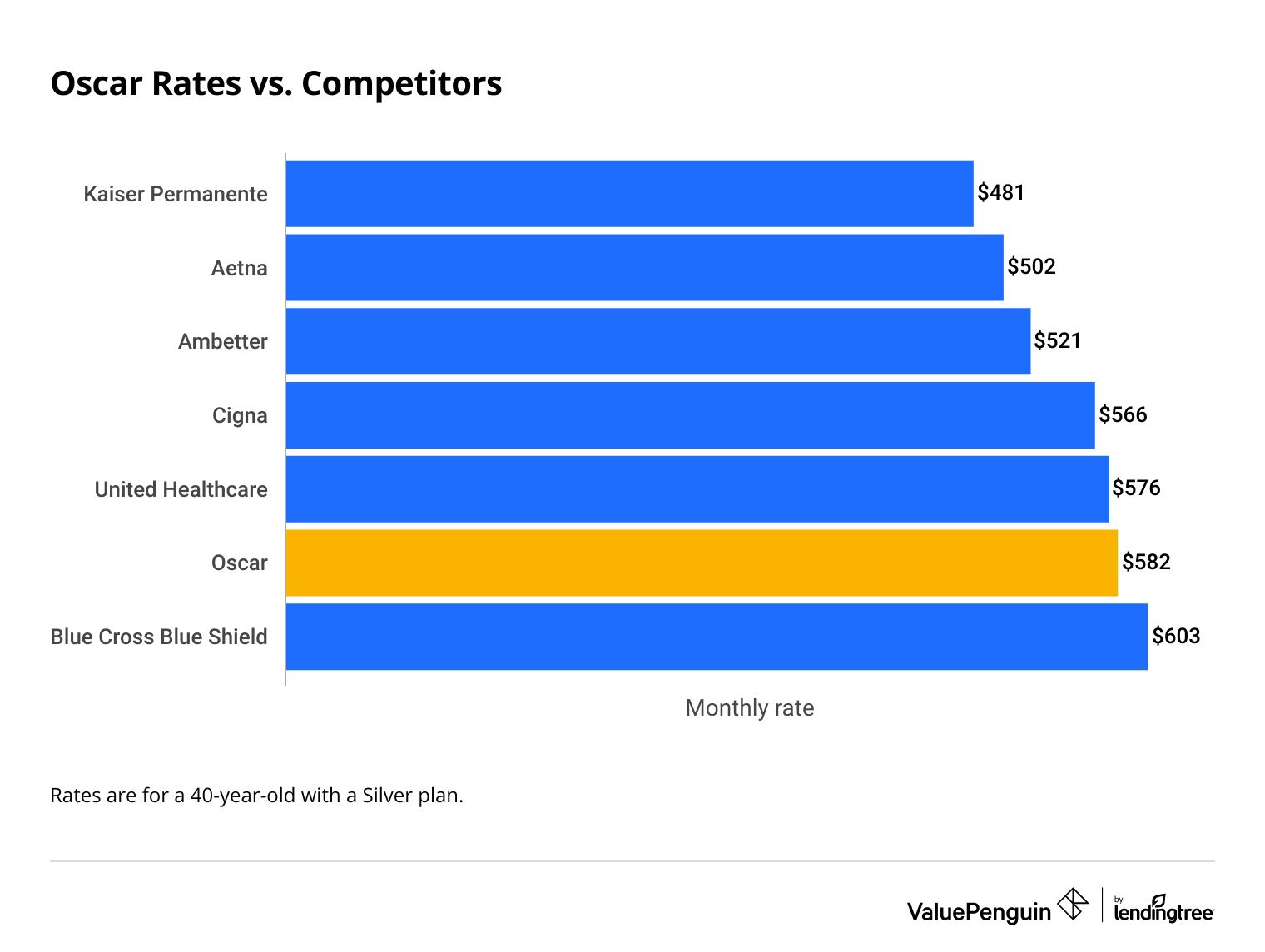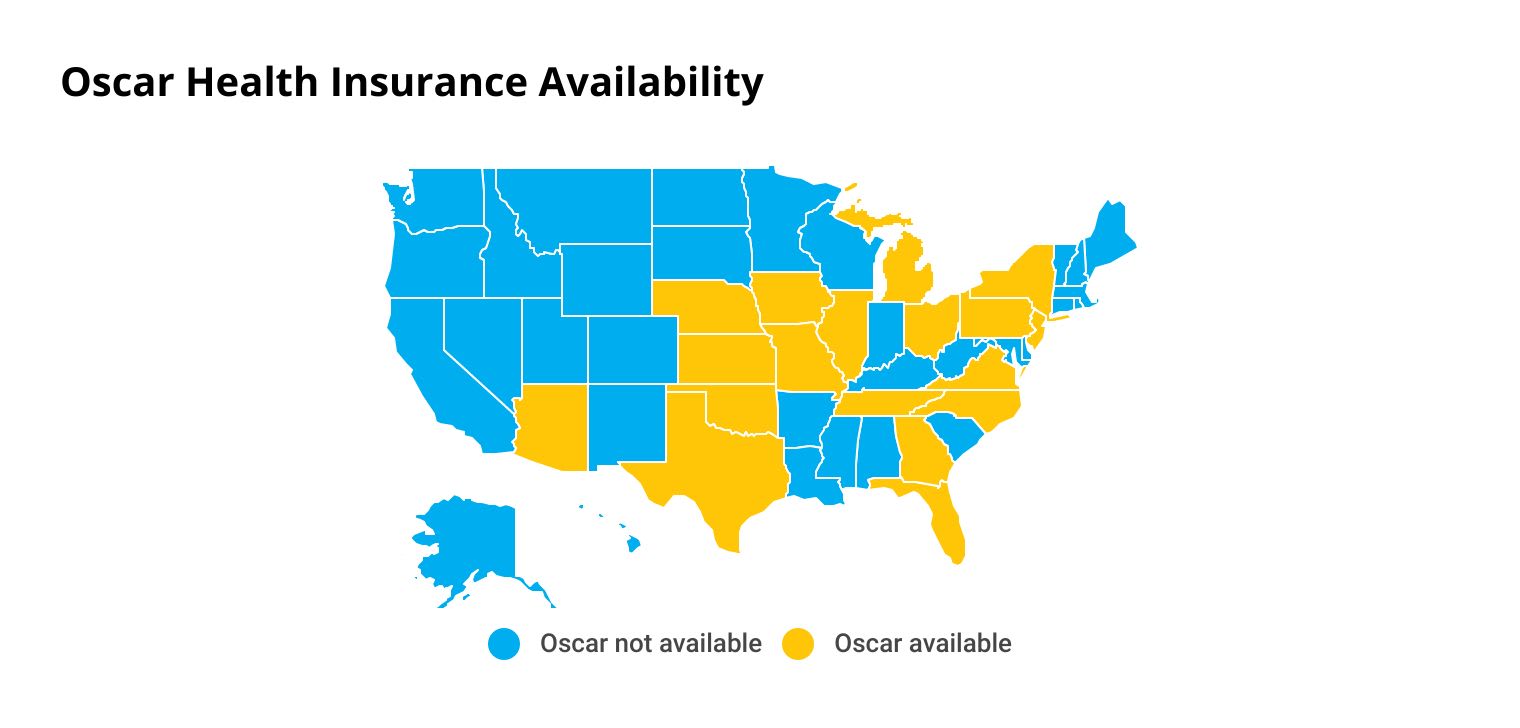Oscar Health Insurance Review: Great Mobile App, but Poor Customer Satisfaction
Oscar stands out for its strong app, but plans are expensive and the company has a high number of customer complaints.
Find Cheap Health Insurance Quotes in Your Area
Oscar is a company that offers some notable member benefits, and it operates in 18 states. This includes an excellent mobile app that customers can use for virtual doctor visits, some of which are free.
But the company charges above-average prices. It also has poor ratings from HealthCare.gov and a high number of customer complaints. Other companies may give you a better value.
Pros and cons
Pros
Good mobile app
Gives you a care team
Free virtual primary care
Cons
Bad customer service
Only in 18 states
No vision and dental coverage
High rates
Oscar Health Insurance: Impressive mobile app, but poorly rated
Oscar plans are good if you want the convenience of a well-designed mobile app with helpful features like virtual health visits. Shoppers can also browse plans and Oscar's health insurance doctor network on the company's website.
The doctor search includes interactive maps, reviews and ratings to help with your selection. Once you're a member, you can interact directly with network doctors to schedule visits.
While Oscar stands out for the quality of its mobile app, the company falls short when it comes to the quality of its plans and customer experience. Oscar's plans are poorly rated by HealthCare.gov. The company also gets significantly more complaints compared to an average insurance company of the same size.
Best alternatives to Oscar health insurance
- Kaiser Permanente is one of the best health insurance companies for customer satisfaction and plan quality. However, it's not available in every state.
- Aetna has the cheapest average Silver plan prices of any national health insurance company.
- UnitedHealthcare offers a range of extra benefits like wellness and telehealth programs.
Oscar Health Insurance plan options and costs
Oscar has some of the highest prices of any major health insurance company.
An Oscar Silver health plan costs $582 per month on average for a 40-year-old. That's $101 more per month compared to an equivalent plan from Kaiser Permanente.
Find Cheap Health Insurance in Your Area
When it comes to cost, Oscar comes in sixth place out of seven of the largest health insurance companies in America. Only Blue Cross Blue Shield (BCBS) has higher average prices.
Average monthly cost of Oscar vs. top competitors
Plan tier | Bronze | Silver | Gold |
|---|---|---|---|
| Oscar | $485 | $582 | $646 |
| Kaiser Permanente | $373 | $481 | $501 |
| Aetna | $394 | $502 | $528 |
| Ambetter | $449 | $521 | $563 |
| Cigna | $481 | $566 | $697 |
| UHC | $452 | $576 | $633 |
| BCBS | $470 | $603 | $656 |
Based on the average cost for a 40-year-old.
Oscar sells health insurance in all five plan tiers . However, you might not be able to get some plan levels, depending on where you live. For example, Oscar only sells Platinum plans in New York.
Generally, monthly rates are lowest for Catastrophic plans and most expensive for Platinum health insurance.
While you pay more per month for Gold and Platinum plans, you'll pay less when you get health care. These plans are best for people who have a chronic illness or who visit the hospital often.
In some areas, Silver plans might cost more than Gold plans because Silver plans offer income-based subsidies that help to lower your out-of-pocket insurance costs. Some health insurance companies have raised the cost of their Silver plan rates to cover these subsidy costs.
Compare plans carefully, including potential subsidies, to make sure you're getting the best deal.
Oscar plan options
Within the Affordable Care Act plan tiers, Oscar may offer one or more of its own plan categories: Simple, Classic or Elite. A Simple plan has lower monthly rates but you pay more when you see the doctor. Classic and Elite plans are the reverse, with expensive monthly costs, but you'll pay less when you access medical care.
A Simple plan is good for people with average healthcare needs. It has a low deductible, , which you can meet quickly if you have more frequent medical needs.
With a Simple plan, you'll pay a larger percentage of your medical bill, also known as coinsurance, compared to other plan options. Simple plans are mostly available in the Bronze and Silver plan tiers.
Many Simple plans are available for plans that are designed for people with certain illnesses, such as diabetes and COPD, also called condition-specific plan options.
With a Classic plan, you pay the highest copays among the three plan types. For those with the most frequent health needs, Elite plans are a better choice than Classic plans. Once you meet your deductible, Elite plan copays and coinsurance are lower than what you'd pay with a Classic plan.
Elite plans are best for people who need a lot of medical care since it doesn't have a deductible for doctor visits. However, some Elite plans have a separate drug deductible, so you'll want to avoid those options if you need help with prescription costs. Elite plans mostly charge flat copays, although you may pay a relatively cheap coinsurance for some services.
Oscar plans cover preventive lab testing, and you'll pay less if you use one of Oscar's preferred labs: BioReference, LabCorp or Quest Diagnostics. If you have or purchase an Oscar policy, make sure to ask your doctor to send any lab work to a preferred hospital.
Oscar Medicare Advantage
Oscar no longer sells Medicare Advantage plans. Oscar has said that it will maintain coverage for people who already have Medicare Advantage plans through the end of 2024.
Member resources and unique features
Oscar offers unique customer benefits like wellness programs and dedicated customer support staff in addition to standard health resources. All of these resources can be accessed through the Oscar smartphone app or website.
In the app and website, you can monitor your progress toward the deductible and access telehealth therapy tools. You can track your steps in the app and get rewarded with up to $75 per year if you reach your step goal.
Once you buy an Oscar health plan, you'll get a welcome kit that includes your plan ID cards, a summary of the policy benefits, and a list of all the extra benefits.
Oscar dedicated care team
Oscar assigns you a "dedicated care team" to help you with your insurance and health care needs. This is a group of professionals, including healthcare guides and nurses, who can give round-the-clock health advice. Your care team helps with billing issues and policy questions, and it can help you find an available doctor or the best urgent care clinic or emergency room for your situation.
You will get the same Oscar employees each time you need help. This allows your team to get to know you and your specific health insurance needs and policy. You can access your care team and video conference with them through the Oscar mobile app.
Oscar Care
Oscar Care offers free virtual urgent care and, in some areas, free virtual primary care. With virtual care, you can have a face-to-face visit with an Oscar doctor remotely, from any location at any time. Through an Oscar Care visit, your doctor can diagnose your issue, order prescriptions and even make an appointment with a specialist for you if needed.
Where does Oscar sell health insurance?
Oscar sells health plans in 18 states.
Plan availability also depends on the county you live in since Oscar doesn't always sell plans statewide. In recent years, Oscar has begun to pull back from certain states. For example, it no longer sells regular health insurance plans in California, Colorado and Arkansas.
Oscar also no longer offers Medicare Advantage plans in New York and Texas, although you can still buy a regular health plan in those states.
States where Oscar health plans are available
Customer reviews and complaints
Oscar Health customers are dissatisfied with the company as a whole, but happy with its mobile app.
Apple users gave the Oscar app 4.9 out of 5 stars and it has a 4.7 out of 5 rating on Google Play. Oscar members also like the Oscar Care benefit, which allows quick access to virtual medical care from any location.
Still, Oscar falls short in the areas of overall customer service, customer billing and finding an in-network doctor. If you have a doctor you prefer, it's best to confirm that you can use that doctor before buying a policy. Oscar members also are unhappy with the company's limited plan choices and lack of dental and vision coverage.
According to the National Association of Insurance Commissioners (NAIC), an industry group, Oscar gets roughly three and a half times as many complaints as an average health insurance company of the same size. In addition, Oscar has the worst overall rating from HealthCare.gov among any major health insurance company. These ratings include plan quality and customer satisfaction measures.
Oscar won't be the best choice for most people because of its subpar quality and high prices. Instead, consider Kaiser Permanente or Blue Cross Blue Shield if plan quality and customer service are top priorities for you. Aetna may be a better choice if price is your primary concern when shopping for a health insurance plan.
Frequently asked questions
Is Oscar health insurance good?
No, Oscar's plans are expensive, and the company's poorly rated by HealthCare.gov. In addition, Oscar gets significantly more complaints compared to an average insurance company of the same size.
For some shoppers, Oscar's mobile app and Oscar Care benefit may be worth the extra cost.
Is Oscar health insurance going out of business?
No, Oscar health insurance is not going out of business. However, the company has pulled out of several major insurance markets in the past few years including California, Colorado and Arkansas. Oscar also no longer sells Medicare Advantage plans.
What type of insurance is Oscar Health?
Oscar Health sells individual health insurance through federal and state insurance marketplaces or on the Oscar Health website. The company also offers small-group insurance to businesses with up to 50 employees. As of 2024, Oscar no longer sells new Medicare Advantage plans.
Methodology
To calculate rates for Oscar health insurance, individual health insurance rates were taken from the Centers for Medicare & Medicaid Services (CMS) for plans available on HealthCare.gov.
To analyze Oscar's customer service, ValuePenguin collected ratings from HealthCare.gov and customer complaint rates from the National Association of Insurance Commissioners (NAIC).
Editorial note: The content of this article is based on the author's opinions and recommendations alone. It has not been previewed, commissioned or otherwise endorsed by any of our network partners.



